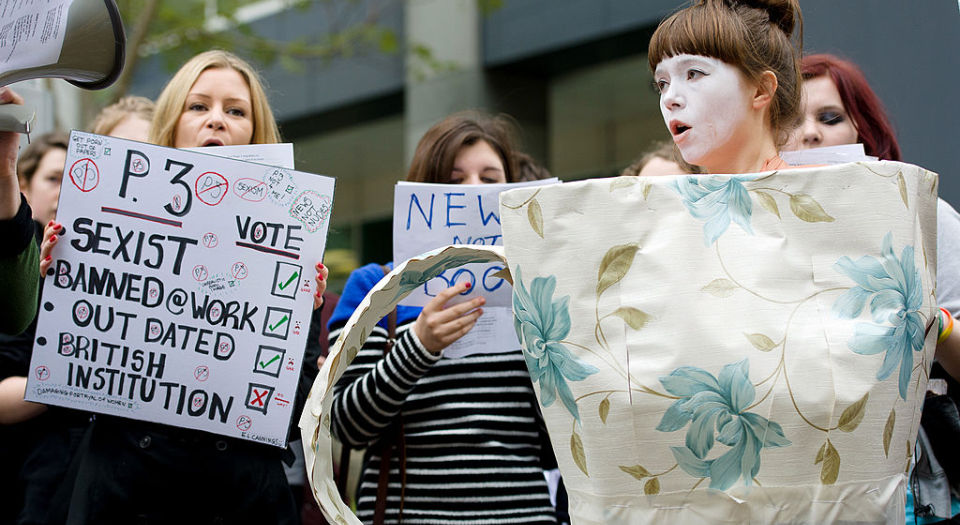
Long-read
Sex, politics and censorship
Porn Panic! provides a frightening portrait of the left’s abandonment of liberty.
Want unlimited, ad-free access? Become a spiked supporter.
The political journey of Jerry Barnett, the author of Porn Panic! Sex and Censorship in the UK, has been a fascinating if rather unusual one. His grandfather, Albert, was among the thousands of Jews, locals and Communists who fought off Oswald Mosley’s blackshirts when they tried to march through the Jewish East End in 1936. The Battle of Cable Street, as it became known, was an inspiring example of people taking matters into their own hands. ‘Women threw heavy pots out of the windows on to the fascists’ heads. The police deployed their truncheons against the protesters, but were beaten back, along with the fascists’, writes Barnett. Albert’s daughter, Jerry Barnett’s mother, was also politically active – in the Women’s Lib movement in the 1960s, campaigning for equal rights and sexual liberation. He himself joined the socialist Militant Tendency in the 1970s. But after Margaret Thatcher’s historic defeat of the miners in 1985, Barnett, like many on the left, dropped out of politics.
It was his experience in the porn industry that eventually brought him back to political activism. By that stage, he writes, the left was unrecognisable. As Barnett argues, since the French Revolution, the left has been associated with progress, liberty and equality, and the right with the maintenance of the status quo. But today, the threat to liberty no longer comes from right-wing moralists, such as the ‘veteran decency campaigner’, Mary Whitehouse. Rather, it comes from a new army of morality campaigners largely on the left. ‘The old moralists had wielded the Bible in one hand, and the Daily Mail in the other’, writes Barnett. ‘This new movement was younger. Instead of coming from Middle England, it arrived from academia. Rather than use the language of religious morality, it appeared under the umbrella of feminism and liberalism. And in place of the Mail, it was backed by the Guardian.’
The complete transformation of the left was disconcerting for Barnett. ‘I was a Labour-voting (well, until Iraq anyway), Guardian-reading leftie; what had happened to my tribe?’ It is particularly the ban-happy nature of the puritanical left that disturbs Barnett. ‘The reality – that the Guardian has taken a conscious decision to become a pro-censorship paper – is hard to swallow. It took me, once a loyal Guardianista, several years to appreciate what had happened’, he writes.
Barnett fought against the National Front in the 1970s. He now sees his fight to be against the ’new fascists’ – the left. I agree that the left today tends to undermine the very principles its representatives fought for in the past – liberty, equality and democracy – but the overused term ‘fascists’ is not particularly useful or illuminating as a description of the left. Where Barnett is right, however, is in locating the problem with the left in terms of a loss of faith in Enlightenment values. That is, because the left has abandoned human autonomy, agency and the power of reason, it will now ‘accept the right of the state to intervene in the most trivial matters of interpersonal speech and political and artistic expression’. Hence the case for state interference is largely made by the left rather than the right. As Barnett argues, ‘this new, authoritarian, puritanical movement of the left has been so successful that the conservative right has abandoned its old moralistic language and appropriated the new terminology of the left’.
Barnett focuses much of his ire on contemporary feminism – which has been transformed from a ‘force for liberation’ into a ‘force for censorship’. ‘Having spent years arguing that women were equally capable to men’, writes Barnett, ‘[feminists now argue] that women [are] indeed the weaker sex, requiring additional protection from the state’. The fact that Labour leader Jeremy Corbyn could entertain the idea of women-only carriages on trains indicates the changing attitudes to equality.
Barnett systematically takes apart the arguments of the new moralists, and shows the shoddiness of the ‘science’ they rely upon. Take feminist campaign-group Object’s shocking claim that ‘polls suggest 63 per cent of young women aspire to be glamour models or lap dancers’. This figure was arrived at by asking young women whether they would rather be Abi Titmuss (a model and actress), Germaine Greer (a feminist author and academic) or Anita Roddick (a businesswoman). As Barnett writes: ‘It was meaningless fluff designed to generate press coverage, but from Object’s point of view, it constituted evidence.’
Barnett recognises that to defend free speech we need to wholeheartedly defend the right of those with whom we disagree to say and think whatever they want. We have the right and capacity to challenge or ignore them, as we see fit. ‘Only a true elitist could try to dictate which ideas other people have access to, rather than join the debate and win by force of reason’, he writes. The most shocking aspect of the new forms of censorship for Barnett was the near silence on this issue from so-called liberals. ‘I found many apparently liberal people were only opposed to censorship of things they enjoyed, but would not extend that principle to things they disapproved of.’
Barnett defends pornography because he thinks it is a good thing. But he is equally prepared to defend the rights of those with whom he disagrees.
Not that he always had such a principled position on free speech. In the 1970s, Barnett supported the left’s No Platform policies. Even in 2009, when Nick Griffin, the then leader of the far-right British National Party, was invited to appear on BBC’s Question Time, Barnett was among those protesting outside the BBC’s studio about its decision to give Griffin a platform. However, he is now prepared to admit he was wrong to do so. It dawned on Barnett that Griffin’s ideas were neither powerful nor dangerous. In the television debate, Griffin’s simplistic and outdated ideas were exposed, and proved very easy to challenge.
In universities, No Platform policies have been extended to an ever-growing list of individuals whose ideas are seen as too dangerous for students to be exposed to. The erosion of liberal values in universities – with the emergence of trigger warnings, Safe Spaces and the banning of ‘homophobic’ or ‘misogynist’ songs – is, as Barnett puts it, one of the ‘most worrying signs of the change to British political culture’.
Barnett also raises concerns about the lynch-mob mentality of today’s moral entrepreneurs. This is perfectly encapsulated by the witch-hunt in 2013 against Isabelle Sorley, then 23, and John Nimmo, then 25, who were arrested and jailed for sending abusive messages to journalist Caroline Criado-Perez on Twitter. The public vilification of two rather pathetic individuals demonstrates the mean-spirited streak that runs through today’s elites, and their middle-class, liberal and lefty supporters. ‘The trial coverage reeked of sneering class snobbery’, Barnett writes. ‘The greatest impetus for censorship tends to come where unacceptable lines are crossed, and there is no line more fiercely defended by the middle classes than between themselves and the great unwashed.’
The fact that hardly anyone questioned whether the state should have the right to arrest and imprison people for what they say or write, shows the extent to which liberals have abandoned any belief in liberty. Drawing on the great work of the English philosopher John Stuart Mill, Barnett argues for the importance of differentiating between words and deeds. Of course, there are some exceptions, such as an army general ordering his troops to shoot randomly. But as Barnett points out, that is an order to be obeyed, not an argument to be debated.
Humans are not automatons who respond unthinkingly to words or images. Central to Enlightenment thinking is the idea that we are all capable of listening to, weighing up and refuting ideas if we disagree with them. If we think only some people can be exposed to backward ideas without turning into racists or misogynists, we have given up on the idea of equality. To silence ideas liberals don’t like, denies others the opportunity to challenge those ideas.
Porn Panic! does glorify pornography, and I found the arguments for porn unpersuasive. But Barnett provides an entertaining – albeit frightening – picture of the transformation of left-wing politics over the past three decades. He provides a refreshing defence of human autonomy and agency and our ability to find solutions to life’s many challenges without state interference. ‘Human problems require human responses’, concludes Barnett, ‘not the smothering security blanket preferred by the British state’.
Helene Guldberg is author of Reclaiming Childhood: Freedom and Play in an Age of Fear, and Just Another Ape?. Visit her website here.
Porn Panic!: Sex and Censorship in the UK, by Jerry Barnett, is published by Zero Books. (Order this book from Amazon(UK)).
Picture by: Getty Images
You’ve hit your monthly free article limit.
Support spiked and get unlimited access.
Support spiked and get unlimited access
spiked is funded by readers like you. Only 0.1% of regular readers currently support us. If just 1% did, we could grow our team and step up the fight for free speech and democracy.
Become a spiked supporter and enjoy unlimited, ad-free access, bonus content and exclusive events – while helping to keep independent journalism alive.
Monthly support makes the biggest difference. Thank you.






Comments
Want to join the conversation?
Only spiked supporters and patrons, who donate regularly to us, can comment on our articles.